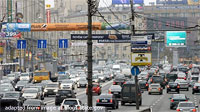Traffic Law Enforcement Disparity ‘Destabilizes’ Society

(Moscow Times – themoscowtimes.com – Yekaterina Kravtsova – April 1, 2013)
In a meeting with traffic police on Friday, Interior Minister Vladimir Kolokoltsev said the preferential treatement given to certain “categories of people” for traffic violations significantly destabilized society.
He did not specify which categories he was referring to, but in recent years there have been numerous cases in which officials’ relatives were exonerated in serious car accidents, triggering public anger.
One of the most high-profile cases of this kind happened in 2009 when Anna Shavenkova, daughter of a United Russia official in the Irkutsk region, received a 14-year deferral of punishment after she violated traffic rules and killed two people walking on the sidewalk.
‘We need to revise the law on traffic or create a new one.’
Vladimir Fyodorov
Senator
Federation Council Senator Vladimir Fyodorov said he agreed with Kolokoltsev. “We immediately need to revise the law on traffic or create a new one,” he said, Interfax reported.
Prime Minister Dmitry Medvedev, who headed the meeting, said about 30,000 people die in Russia every year in car accidents because of poor quality roads and badly organized traffic.
Medvedev in his speech referred to an accident in the Vologda region on Thursday that killed six people and injured 24, including 21 children from a St. Petersburg orphanage, after a bus carrying the children crashed into a van and a passenger car.
“Unfortunately, accidents like this show that we are far from being at our best in everything,” Medvedev said.
Last year, the government started a large-scale campaign to reduce the number of car accidents. The state plans to introduce stricter rules for driving schools, and at the end of last year Medvedev proposed raising maximum fines for traffic violations to $16,000.
Medvedev was also an initiator of zero tolerance on drunk driving, but this measure did not find much support in society because many Russian staples, such as popular dairy drink kefir, contain a trace amount of alcohol.
During a visit later in the day to a traffic police office in Odintsovo, Medvedev was given an opportunity to test an alcohol detector, which left him satisfied.
“Answer me the popular question: Does it react to kefir?” Medvedev asked.
“Certainly not,” the officers said, assuring the prime minister that such allegations were no more than fantasies.
